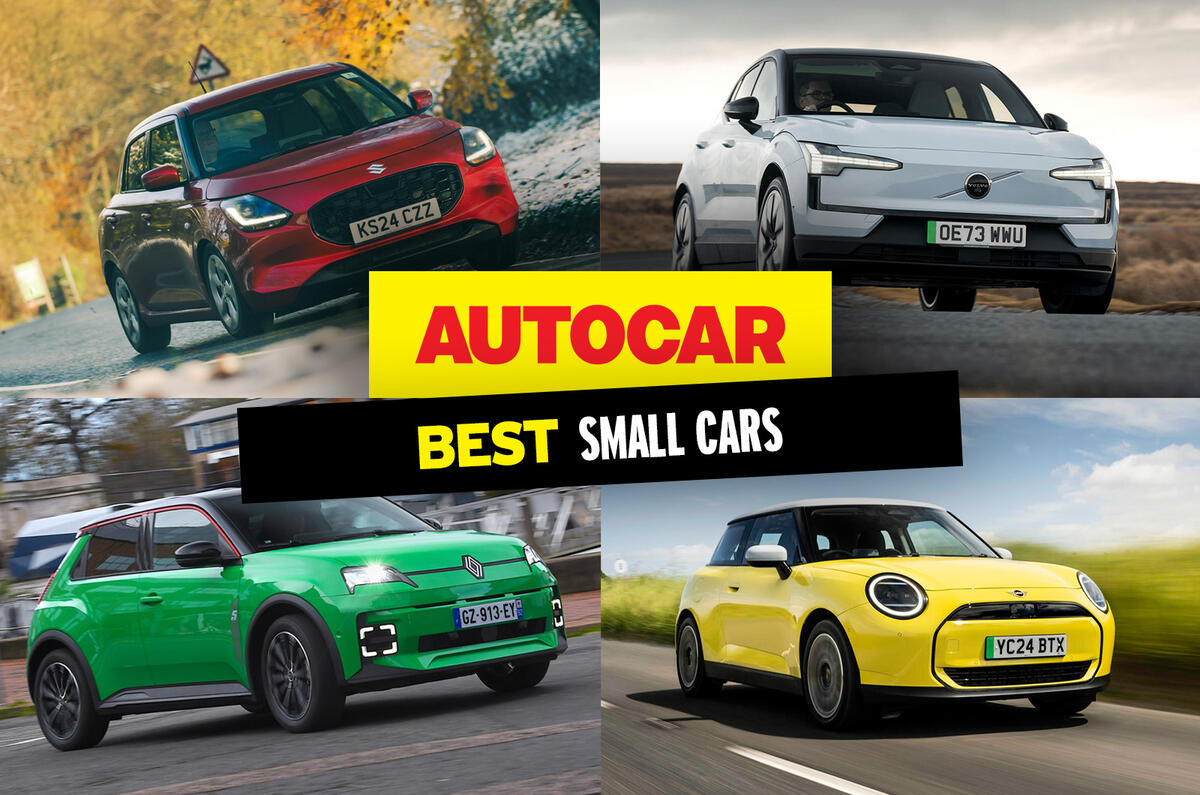The best small cars – driven, rated and ranked
Whoever said size matters? We list the 10 best small cars money can buy today

News
8 mins read
6 February 2025
Share
If the old adage translates into the automotive world, then the best cars must be small.
Yet wander along any major city’s streets and you would be forgiven for assuming most drivers felt they needed a gargantuan SUV to battle rush-hour traffic and arrive home relatively unscathed.
It’s nonsense, really, especially given that most car journeys are within urban environments with only the driver on board.
Related articles
- Renault 5 review
- Electric Nissan Micra unwrapped: Renault 5 twin due this year
- Renault to revive ‘Fast and Furious cars’ as it taps into retro
- Futurama: Renault Group’s new strategy to reach ‘Champions League’
- Renault makes EV fire suppression tech open to all manufacturers
We’ve also lost some big hitters over the last few years, including the Ford Fiesta, the Toyota Aygo and Kia Rio.
But there is some good news: many of the best small cars are among the best cars full stop.
The 10 listed below are our favourite compact conveyances, all bristling with clever features, clipped running costs and bags of cheeky character.
According to our experienced team of road testers, the best small car on sale today is the Renault 5. Read on to see why…
1. Renault 5
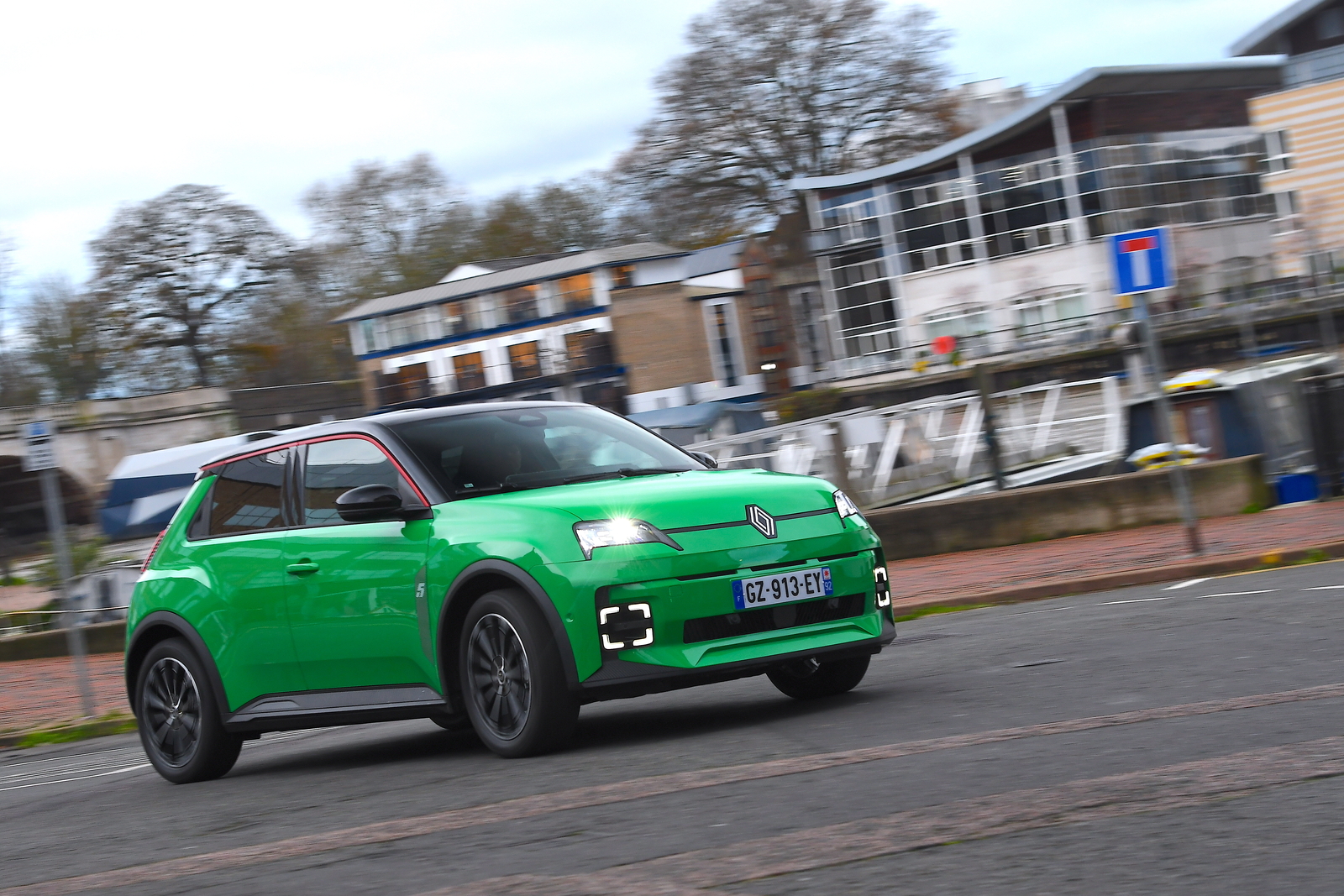
- Design9
- Interior8
- Performance8
- Ride & Handling8
- Costs8
Pros
Comfortable
Good value
Smart interior
Cons
Real-world range down on the official figure
Performance tails off at higher speeds
Limited space in the back
Best for: Style
There’s a school of thought that the third generation gets technology right, and the Mk3 Renault 5 is a manifestation of this thinking, being the French marque’s third attempt at approaching small electric cars after the Twizy and Zoe.
For the car that defined the idea of the supermini in the 1970s only to refine it further in the mid-1980s, there was a danger that a 21st-century retro revival of the Renault 5 could be bloated and disastrous.
On the contrary, the 5 E-Tech is a desirable wee thing. Staying within a 4m-long footprint, the five-door hatchback isn’t quite the packaging marvel it was before — batteries and Euro NCAP safety are factors — but it’s close.
Its boot space is good and you will easily get less bulky child seats and older kids in the back seats.
It looks brilliantly proportioned, fun without being forced, offers a fine driving range and is rich in clever details that anyone old enough to remember the original 5 will recognise.
These will be everywhere very quickly and rightly so. Vive la Cinq.
Read our Renault 5 review
Save money on a new Renault 5 with What Car?
Finance this car with Drivenfi
Latest Reviews

Mercedes-AMG CLE 53
8

Volkswagen Tiguan
7

Honda Civic Type R
9

Used BMW 3 Series Touring 2012-2019 review
9
Used BMW 3 Series Touring 2012-2019 review

Aston Martin Vantage Roadster
Read our review
Car review

Renault 5
Electric supermini offers attention-grabbing style and the promise of sophisticated dynamics for as little as £23k
Back to top
2. Renault Clio
9
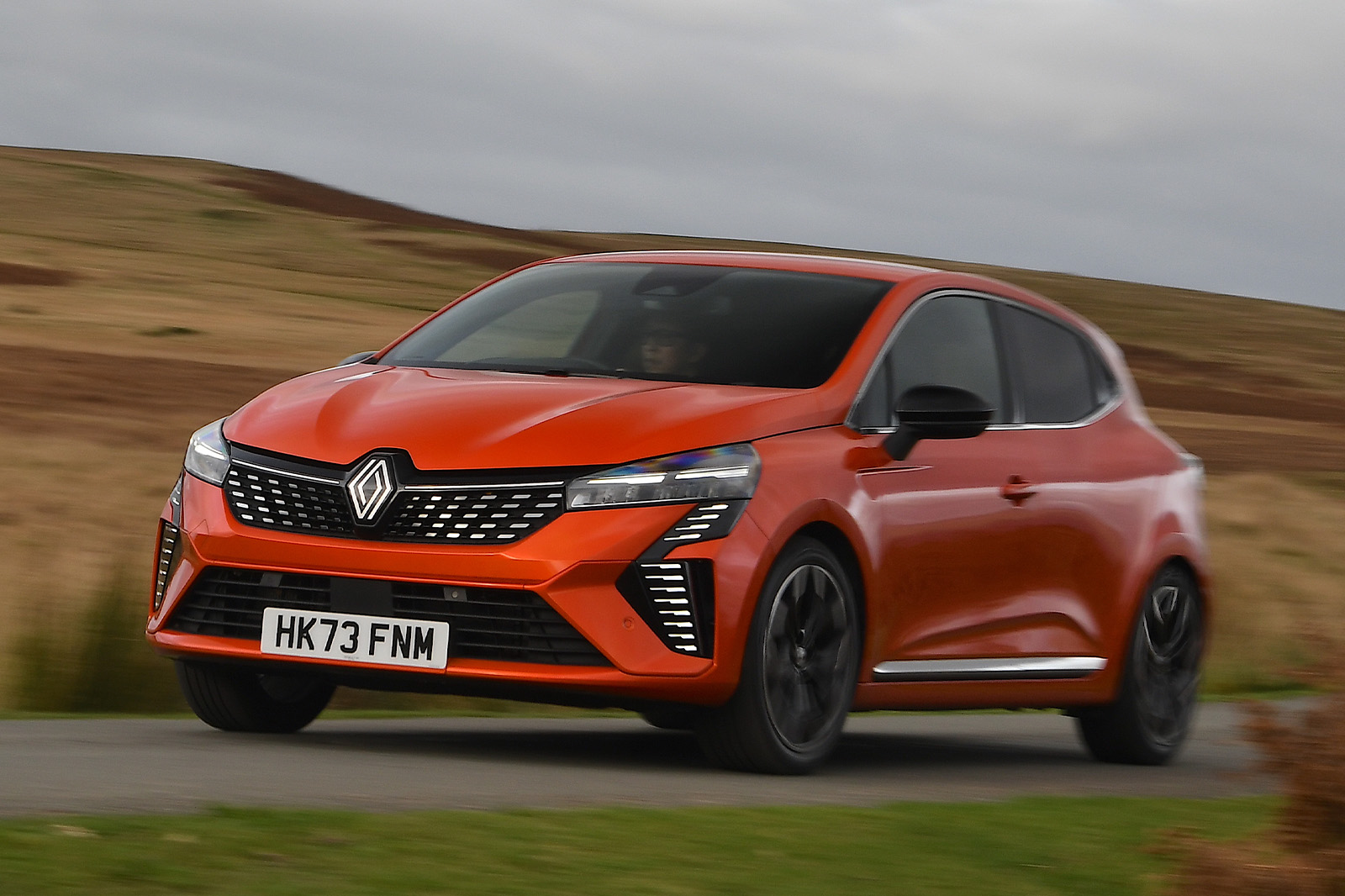
- Design7
- Interior7
- Performance7
- Ride & Handling8
- Costs9
Pros
Engaging handling, refined ride quality
Economical petrol engine
Affordable hybrid option
Cons
Hybrid’s fuel economy advantage is small
Rear passenger space is limited
There’s no hot version any more
Best for: Price
This list began with a new iteration of the car that the original Renault Clio replaced, yet the famous 5’s comeback doesn’t signal the end of Papa and Nicole’s supermini of choice.
A recent facelift revitalised the pared-down Clio range, with the remaining petrol and ‘self-charging’ hybrid options focusing on where its appeal is strongest.
As the cheapest full hybrid on sale, undercutting even the Dacia Jogger Hybrid, the Clio E-Tech doesn’t feel like a budget-priced option. Yet the Clio’s value feels even more extraordinary in pure-petrol TCe 90 guise.
Sadly bereft of a truly sporty derivative these days, the Clio’s handling still bears the hallmarks of an enviable lineage of hot hatchbacks, being enjoyable to hustle at lower speeds, with well-weighted controls and reassuring feedback through bends.
Renault’s commitment to the Clio may not survive the switch to full electrification, but it has outlived at least one significant rival so far. With its freshened looks, engines and tech, that feels more like success than stubborn survival.
Read our Renault Clio review
Save money on a new Renault Clio with What Car?
Finance this car with Drivenfi
3. Volkswagen Polo
8
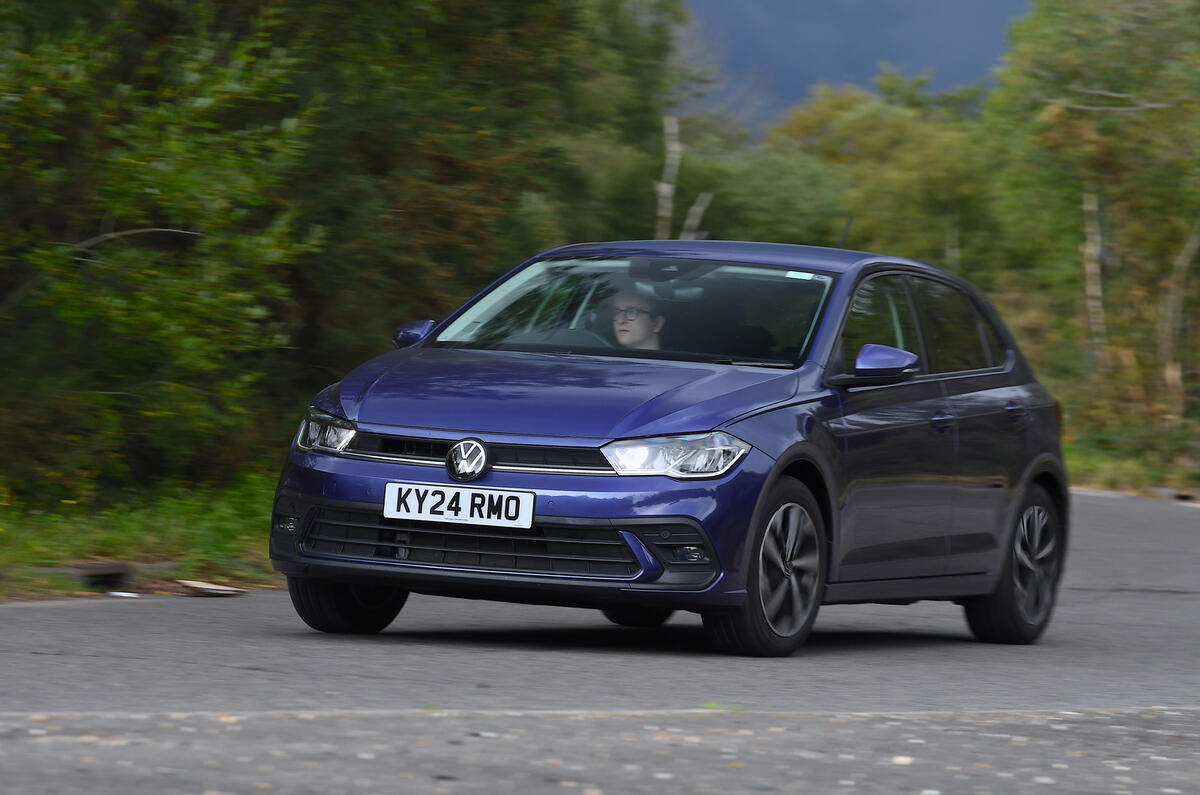
- Design8
- Interior8
- Performance8
- Ride & Handling8
- Costs8
Pros
Relentlessly competent
Can almost rival the larger VW Golf for spec
Strong brand recognition
Cons
Lacks sparkle throughout
Entry level is too basic
It’s very close to the VW Golf in size
Best for: All-round ability
If overall competence and quality are your benchmark, then the Volkswagen Polo occupies a solid place as ‘the essence of small car’.
It clearly resonates with British buyers, as it was the only supermini to secure a spot in the 2024 best-sellers chart.
Make no mistake: the Polo is enduringly compelling because of its all-round competencies. It’s evenly balanced in terms of price, packaging, performance and quality.
It handles with sophistication and it’s decently roomy for four or five adults, and the boot is a usable size too.
Sure, in its cheapest form, the Polo does feel spartan and low on energy, plus the dearest models are well inside Volkswagen Golf territory, but grab yourself a good deal and you will be glad you chose the Polo.
Read our Volkswagen Polo review
Save money on a new Volkswagen Polo with What Car?
Finance this car with Drivenfi
Back to top
4. Mini Cooper E and SE
8
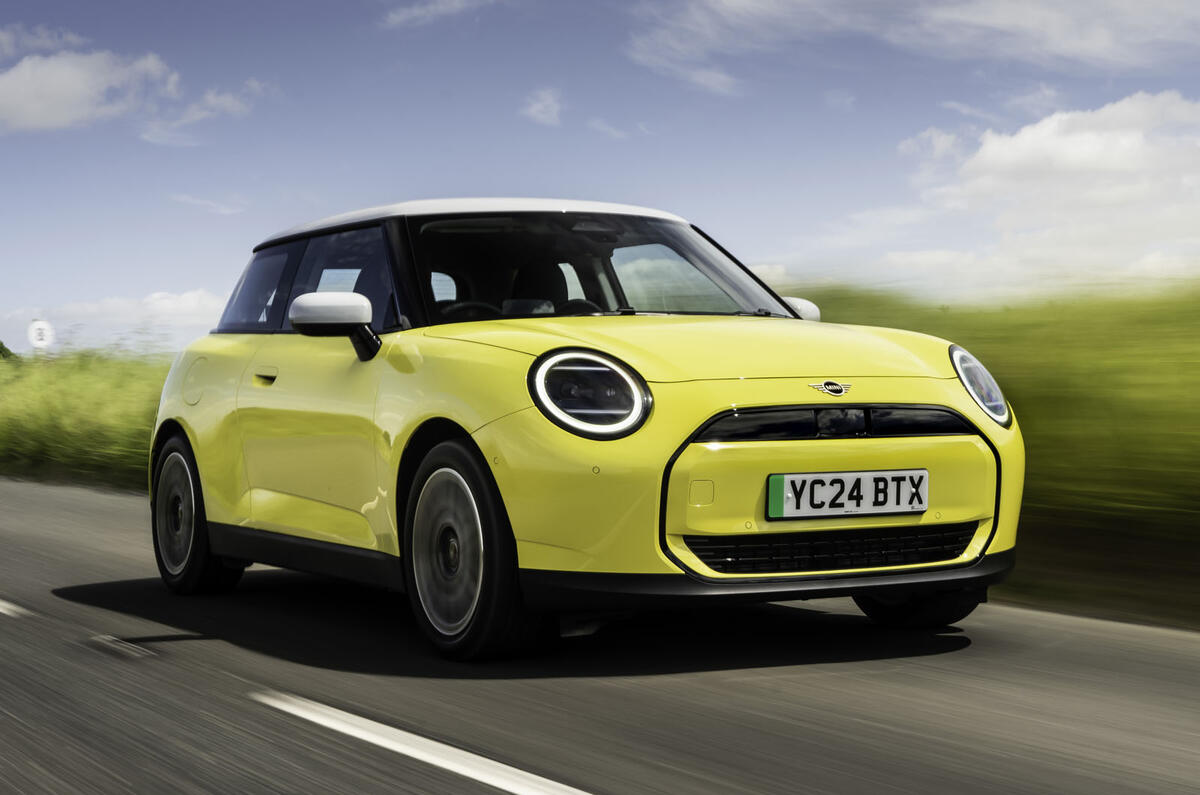
- Design8
- Interior8
- Performance9
- Ride & Handling8
- Costs8
Pros
Still smaller than most cars
Less small on the inside
Range is usefully longer than before
Cons
You can feel how heavy it is
Firm low-speed ride
Five doors would broaden its appeal
Best for: Zero-emission city living
While 2024’s revitalised combustion-engined Mini Cooper models are very effective facelifts of their predecessors, the electric versions are new-new, with a unique platform and, despite the styling similarities, bespoke bodywork.
Diddier dimensions than the Renault 5 also mean smaller batteries for the Cooper S and Cooper SE, but it doesn’t lose out too much in driving range compared with its Gallic challenger.
While the three-door-only EV is still a squeeze for a pair of rear-seat occupants, it’s a tad more spacious than the previous-generation Mini Electric, although it also feels devoid of an nth or two of that car’s sporty character.
Visibility remains Mini-esque, with thick, upright A-pillars creating a letterbox view of the world, while the minimalist fabric-swathed dashboard and wok-sized circular infotainment-and-everything-else touchscreen are divisive.
If you’re a Mini fan, you will love these new EVs – and if you’ve steered clear so far, take one for a test drive before FOMO sets in.
Read our Mini Cooper E and SE review
Save money on a new Mini Electric with What Car?
Finance this car with Drivenfi
5. Toyota Yaris
8
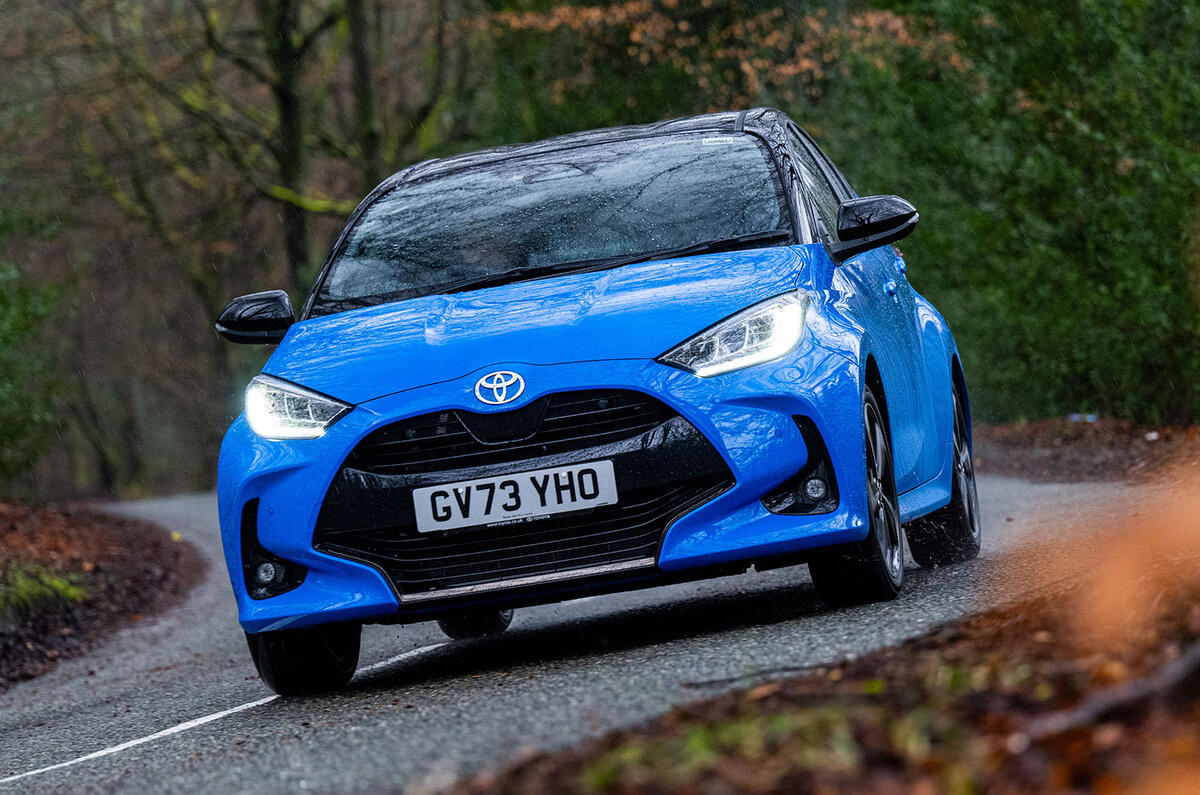
- Design7
- Interior8
- Performance6
- Ride & Handling8
- Costs9
Pros
Low running costs
Satisfying steering and secure handling
Unusually long warranty
Cons
Interior has some hard plastics
Noisy when asked to work hard
Awkward access for rear passengers
Best for: Economy
No longer a cheap, simple car (the Aygo X fulfils that duty these days), the Yaris offers a different kind of simplicity now, thanks to Toyota’s peace-of-mind-boosting engineering.
That sense of intrinsic longevity complements the 1.5-litre hybrid powertrain perfectly, with low running costs and slow depreciation as appealing side effects.
Okay, it’s not the most thrilling small hatchback to drive, but the Yaris nevertheless benefits from a nimbleness common to all diminutive cars, which makes it very effective around town.
That’s further amplified by its unshakable determination to eke every inch of motion from its petrol-electric powertrain, seamlessly slipping into EV mode at every possible opportunity. No matter how hard you drive it, the Yaris will do everything in its power to keep you averaging north of 50mpg.
Rear seat space is sufficient for a couple of adult passengers, although it helps if they’ve studied the methods of Harry Houdini to contort themselves out of the small door openings.
But aside from that, the Yaris is a good-quality, stylish small car with plenty of beneficial on-board technology.
Read our Toyota Yaris review
Save money on a new Toyota Yaris with What Car?
Finance this car with Drivenfi
Back to top
6. Citroën ë-C3
8
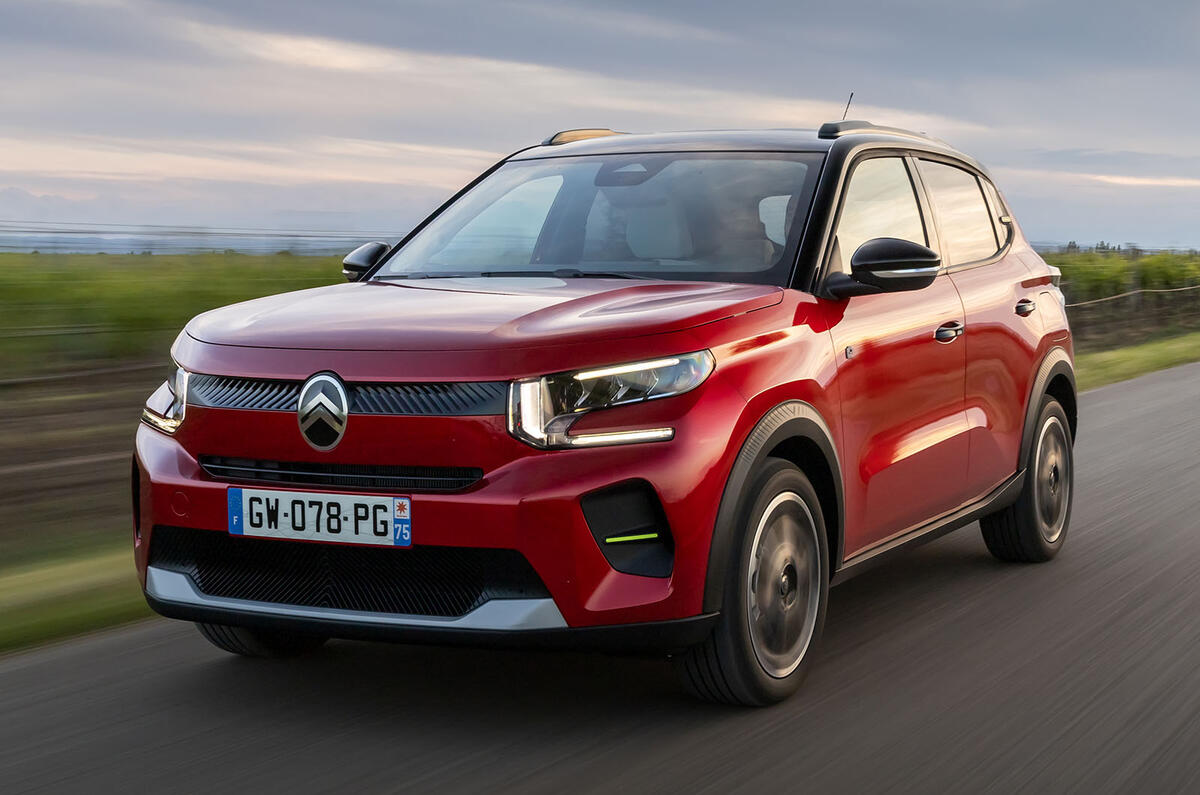
- Design7
- Interior8
- Performance7
- Ride & Handling8
- Costs9
Pros
Comfort-focused ride quality
Clever interior design
Competitive price
Cons
Handling is less convincing
Boot has a high loading lip
A bit tight in the back
Best for: Compact practicality
The new electric Citroën C3’s chamfered boxiness has a dash of SUV-wannabe about it, hinting at the function-before-form approach for which French small cars are historically famous.
While a liberal sprinkling of joie de vivre wouldn’t be unwelcome, if simplicity keeps this electric hatchback’s price down, it’s fine – and it has.
Inside it’s a similar story, although the ë-C3’s novel high-set digital instrument slot and small, squared-off steering wheel feel airy, modern and unfussy, making more space for comfortable, generous front seats and championing the brand’s comfort mantra.
That hasn’t translated quite as effectively in the back, but this car is only a smidge over 4m long and still has a 310-litre boot as well as high-voltage batteries to package within its shell.
A range one mile shy of 200 between charges will suit most urban motorists very well, while the ë-C3’s quiet powertrain and cushioned ride could be just the ticket to help ease off the stresses of the working day on your stop-start-stop trudge home.
Read our Citroën ë-C3 review
Save money on a new Citroën ë-C3 with What Car?
Finance this car with Drivenfi
7. Suzuki Swift
8
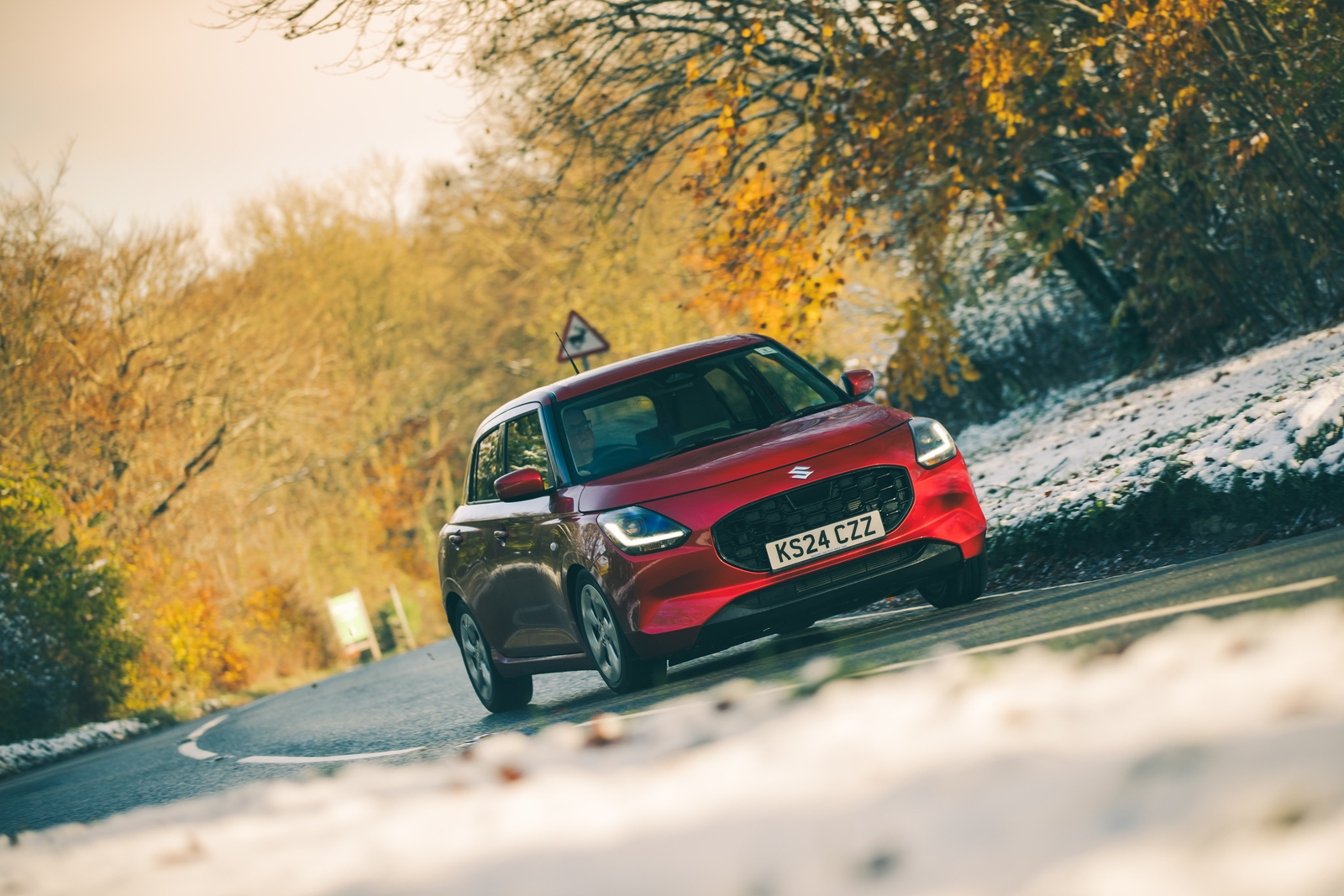
- Design7
- Interior8
- Performance7
- Ride & Handling8
- Costs10
Pros
Light and compact
Well equipped
Well priced
Cons
Scratchy materials
Doesn’t ride as well as the Ford Fiesta did
Tiny boot
Best for: Lightness
‘Simplify, then add lightness’ are often misappropriated words by Lotus founder Colin Chapman, but it’s a mantra that was present for the firm’s sports and racing cars during his lifetime.
It also seems to be the rationale behind how Suzuki goes about engineering its cars, so much so that the latest Swift weighs less than a tonne. Even the gently elevated Allgrip 4×4 version with mild-hybrid electrification on board tips the scales at only 1037kg.
Yet a quick poke around the Swift confirms that everything you would expect to find in it is there: safety kit and all mod-cons, comfortable room inside for a quartet of adults and a fifth for shorter journeys – and yes, there’s a petrol engine under the bonnet.
Clever engineering is at play here and – disappointingly for Suzuki – it’s a quality that’s not better known by the majority of car buyers.
The Swift is light, efficient, well-equipped and good-value and has a degree of handling engagement that encourages to you press on and wring its revvy triple for extra fun. Imagine what a hoot a Lotus version would be.
Read our Suzuki Swift review
Save money on a new Suzuki Swift with What Car?
Finance this car with Drivenfi
Back to top
8. Kia Picanto
7
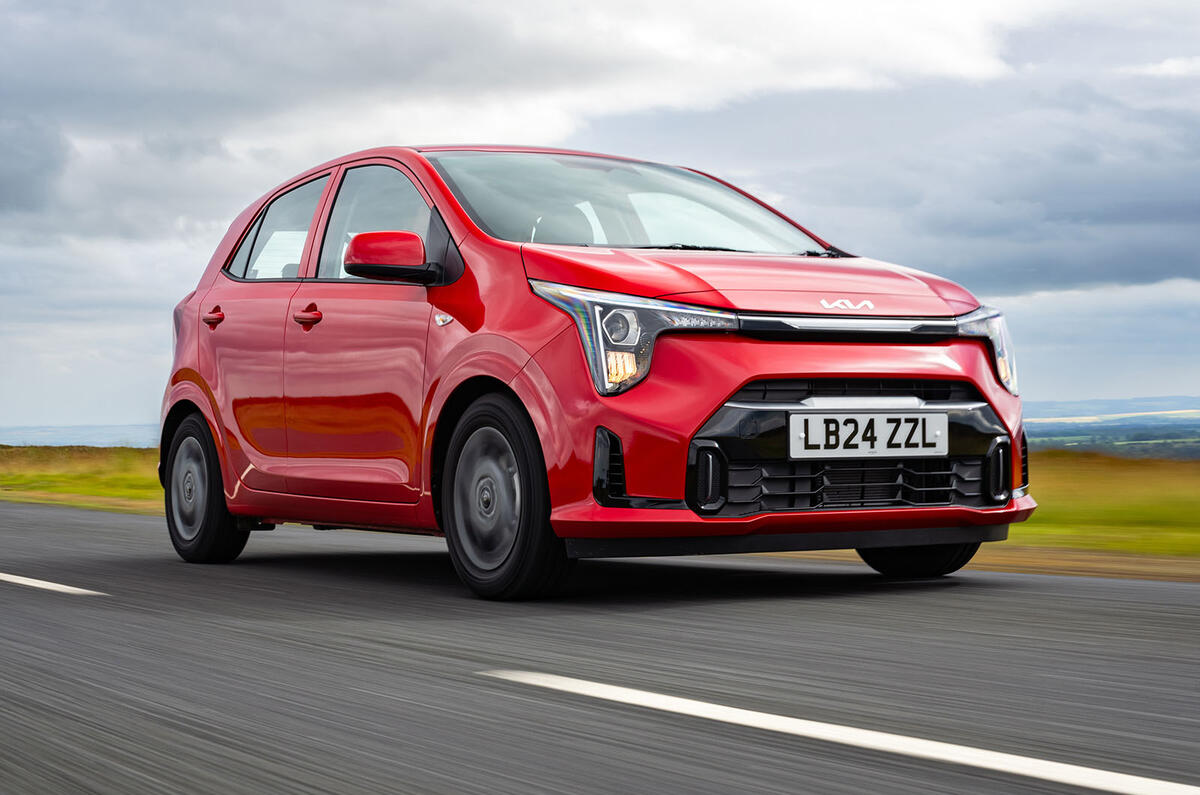
- Design7
- Interior7
- Performance6
- Ride & Handling7
- Costs8
Pros
Very small indeed
Lightweight but well made
Long warranty
Cons
Now one of the slowest cars on sale
Narrow interior feels a tad claustrophobic
Its former cutesiness is missed
Best for: City car proportions
Formerly a cute, underpowered bargain-basement supermini, the Kia Picanto has since received an angry facelift. If it were a terrier, you would fear your ankles were about to get gnawed to the bone.
That snarl is more severe than the Picanto’s bite, though, because one feature deleted at the facelift was its predecessor’s turbocharged triple. Now natural aspiration rules, with a choice of a 1.0-litre three-cylinder or a 1.2-litre four.
A maximum of 77bhp to move the still-sub-tonne Picanto, plus occupants, ensures its performance is adequate rather than peppy.
With the Picanto’s more sedate pace, there’s more time to appreciate the relative quality of its interior and marvel at the delightful precision of its standard-fare manual gearchange.
Perhaps the greatest satisfaction the Picanto serves up as one of the few dinky city-centric cars on sale is how deftly you can nestle into parking spaces that would cause drivers of models from the segment above to break into a spell of clamminess.
Read our Kia Picanto review
Save money on a new Kia Picanto with What Car?
Finance this car with Drivenfi
9. Ford Puma
7
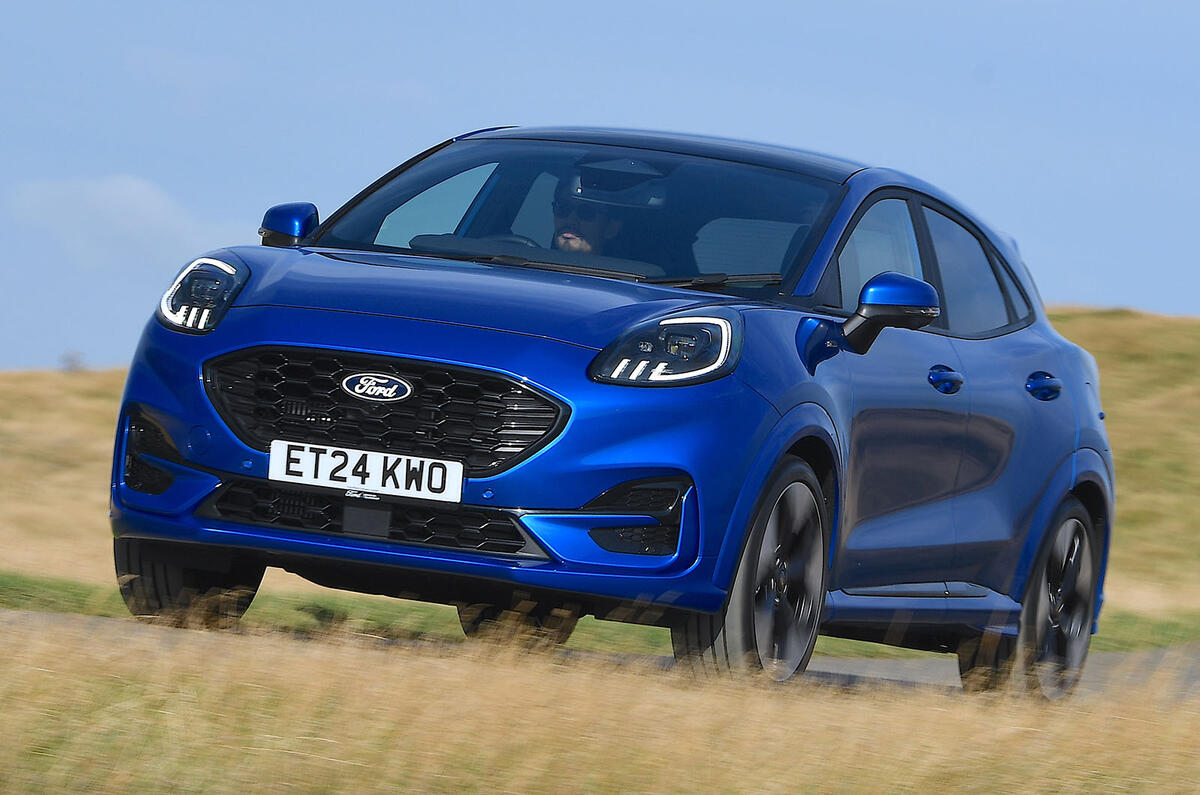
- Design7
- Interior7
- Performance7
- Ride & Handling8
- Costs7
Pros
Expertly packaged small SUV
Good handling and ride
Clever details such as the boot’s Megabox
Cons
Electric Gen-E has short range
Hot ST has been tamed
Rear head room is limited
Best for: Handling
‘Crossover’ is a word that has been used and abused so many times that it has lost all meaning, but if you consider the elements that come together to create the Ford Puma, it’s about the only word that fits.
Inheriting an effective evolution of its 1990s coupé namesake’s style, the small car prowess of the last (and best) Ford Fiesta, enough of the Kuga’s off-road stance to appeal to larger SUV buyers yet still low enough to the ground and agile enough to truly be worthy of handling accolades in hot ST form, the Puma is less of a mashup and more of a symphony of genres.
There’s now an electric version, too, called the Puma Gen-E, although its small battery means it’s less competitive than bespoke EV designs.
All Pumas offer good rear passenger access and high-set rear seats for easier child-seat installation, a huge plastic tub with a plughole for a messier lifestyle kit under the boot floor and styling that looks ‘right’ among a slew of awkwardly angled contemporaries.
Not bad for a car that’s both the spiritual successor to the Ford Fusion and a Ford fusion.
Read our Ford Puma review
Save money on a new Ford Puma with What Car?
Finance this car with Drivenfi
Back to top
10. Volvo EX30
6
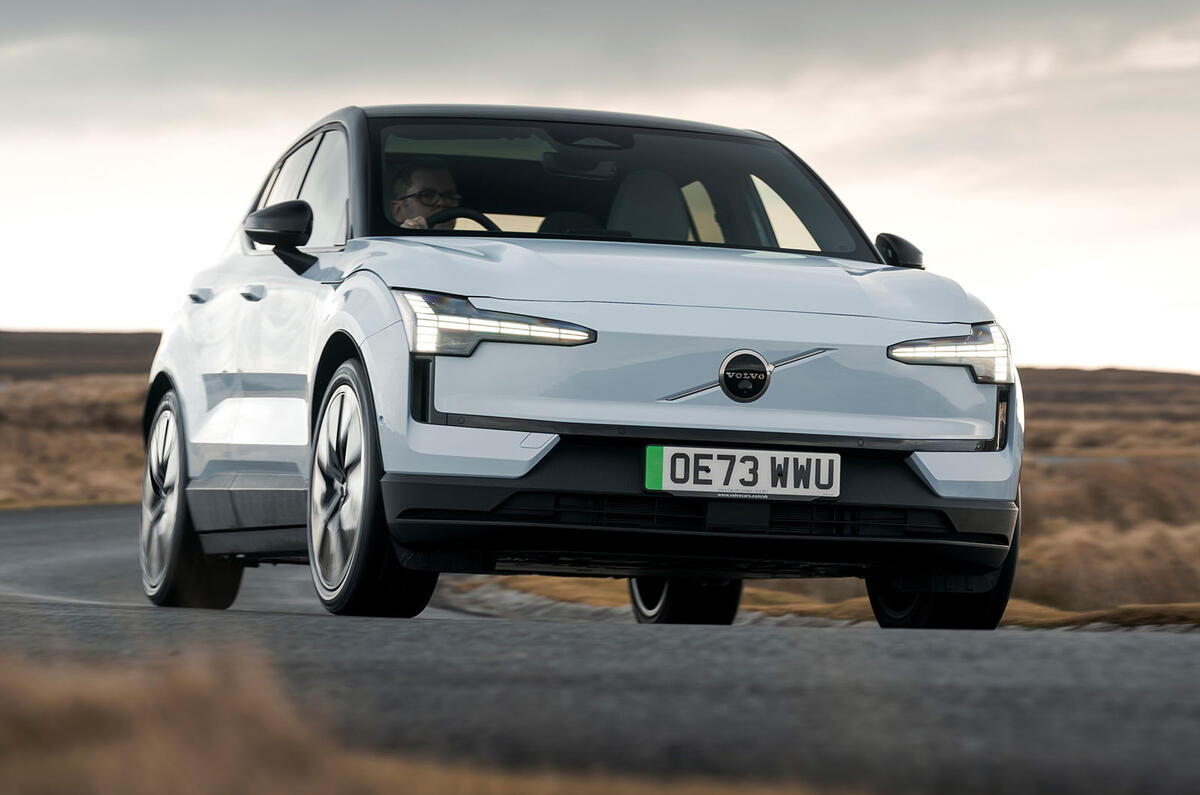
- Design8
- Interior8
- Performance5
- Ride & Handling8
- Costs7
Pros
Upmarket style
Impressive performance even at the entry level
Clever interior packaging for folk and stuff
Cons
Unsettled ride on country roads
Touchscreen-for-everything feels un-Volvo
Irritating technology seems unfinished
Best for: Practicality
Yes, it’s an SUV – just. But given how competitively priced the Volvo EX30 is compared with battery-powered small hatches such as the Peugeot e-208 and Vauxhall Corsa Electric, it’s impossible to ignore here.
Those Stellantis cousins will travel farther on each full charge, but the EX30 outstrips them both for performance, Scandi-cool design and safety. And that’s in entry-level form.
As a compact crossover, that’s where the EX30 makes the most sense: add many more toys or speed and you’re soon wading into EX40 territory, denting the smaller model’s alluring sense of value.
We do have some reservations about the EX30 that its feelgood factors don’t diminish, though.
Yes, its interior is cleverly put together and the unadorned dashboard initially looks fresh, but having virtually all of its controls accessed via a touchscreen that sometimes suffers glitchiness is a black mark against Volvo’s celebrated record of risk-minimising innovations.



